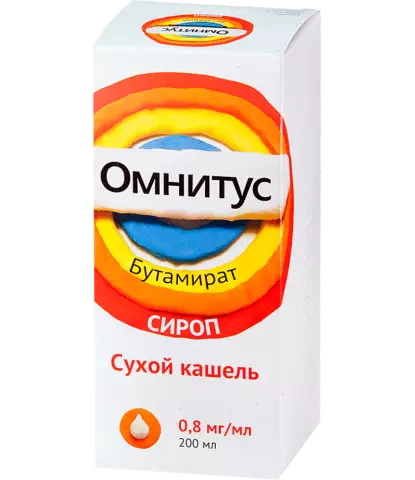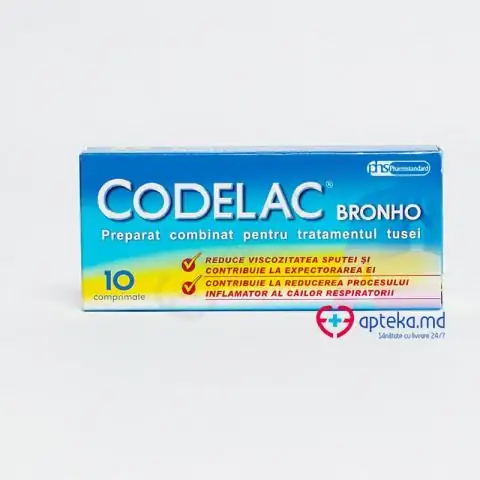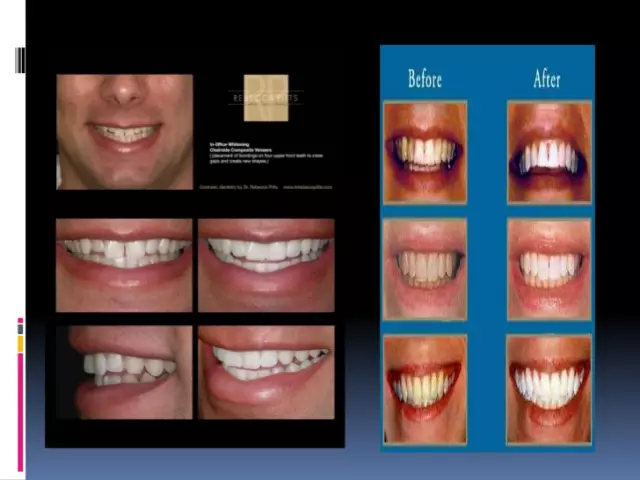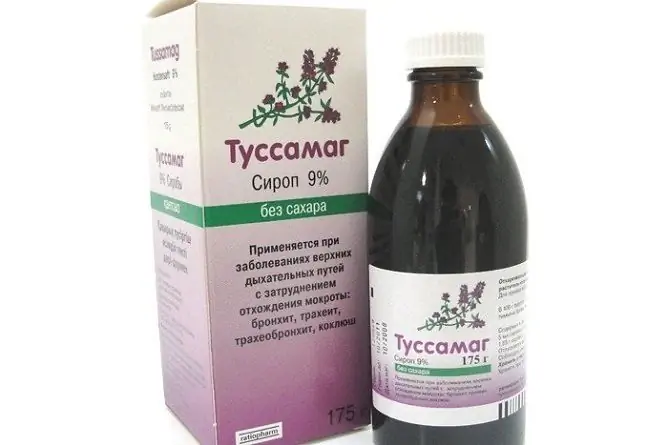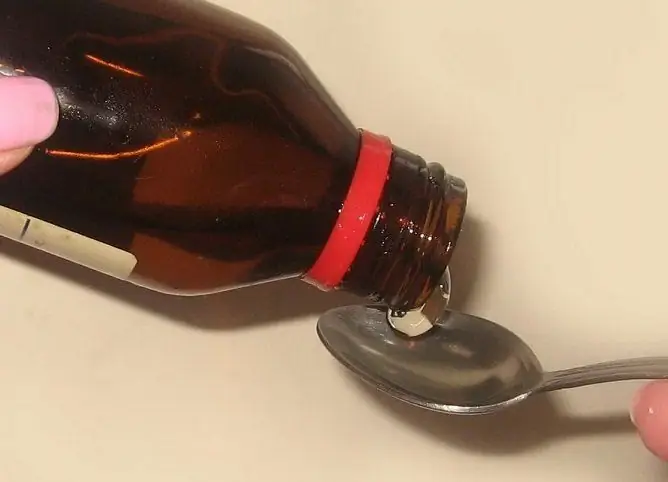- Author Rachel Wainwright wainwright@abchealthonline.com.
- Public 2023-12-15 07:39.
- Last modified 2025-11-02 20:14.
Omnitus
Omnitus: instructions for use and reviews
- 1. Release form and composition
- 2. Pharmacological properties
- 3. Indications for use
- 4. Contraindications
- 5. Method of application and dosage
- 6. Side effects
- 7. Overdose
- 8. Special instructions
- 9. Application during pregnancy and lactation
- 10. Use in childhood
- 11. For violations of liver function
- 12. Drug interactions
- 13. Analogs
- 14. Terms and conditions of storage
- 15. Terms of dispensing from pharmacies
- 16. Reviews
- 17. Price in pharmacies
Latin name: Omnitus
ATX code: R05DB13
Active ingredient: butamirate
Manufacturer: Hemofarm (Serbia)
Description and photo update: 2018-22-10
Prices in pharmacies: from 120 rubles.
Buy

Omnitus is an antitussive agent with expectorant, anti-inflammatory and mild bronchodilatory properties.
Release form and composition
- modified release film-coated tablets: round, biconvex; 20 mg - from yellow to orange, 50 mg - dark red (10 pcs. In blisters, in a cardboard box 1 blister);
- syrup: viscous colorless transparent liquid with vanilla aroma (200 ml each in dark glass vials, sealed with plastic caps with first opening control, in a cardboard box 1 bottle with a 5 ml measuring spoon and a notch for measuring the volume of 2.5 ml).
Pills
Composition of 1 tablet:
- active substance: butamirate citrate - 20 or 50 mg;
- auxiliary components (their content for tablets 20/50 mg): lactose monohydrate (218.5 / 230.5 mg), hypromellose (70/85 mg), talc (10/10 mg), anhydrous colloidal silicon dioxide (2/6 mg), magnesium stearate (8/12 mg), povidone (1.5 / 1.5 mg);
- the composition of the film shell (for tablets 20/50 mg): talc (4.7 / 4.95 mg), macrogol (1.253 / 1.273 mg), ethylcellulose (3.14 / 3.183 mg), hypromellose (5.105 / 5.305 mg), titanium dioxide (1.041 / 1.061 mg); in tablets 20 mg - dye "Sunset Sun" yellow (E 110) (11%) (1.261 mg), in tablets 50 mg - crimson dye "Ponso" 4R (E 124) (2.122 mg) and brown varnish [black dye (E151), dye azorubin (E122), dye "Sunset" yellow (E110)] (0.106 mg).
Syrup
Composition of 1 ml of syrup:
- active substance: butamirate citrate - 0.8 mg;
- auxiliary components: sodium hydroxide (0.1 mg), benzoic acid (1.15 mg), glycerol (290 mg), sodium saccharinate (0.6 mg), sorbitol 70% non-crystallizing (405 mg), ethanol 96% (0.003 ml), anise oil (0.15 mg), vanillin (0.6 mg), purified water (up to 1 ml).
Pharmacological properties
Pharmacodynamics
Butamirate citrate - the active ingredient of Omnitus - has a direct effect on the cough center, improves spirometry and blood oxygenation.
The substance is neither pharmacologically nor chemically related to the opium alkaloids.
Pharmacokinetics
Butamirate citrate is characterized by high absorption. After taking a tablet at a dose of 50 mg, the maximum concentration (C max) in the plasma of the main metabolite is observed after 9 hours and is 1.4 μg / ml, after taking a syrup at a dose of 150 mg, C max is observed after 1.5 hours, equal to 6.4 μg / ml. Has no cumulative effect.
Butamirate citrate is rapidly hydrolyzed in plasma to diethylaminoethoxyethanol and 2-phenylbutyric acid. Both metabolites also have antitussive effects. They are characterized by a high bond with plasma proteins, due to which they are in the plasma for a long time. 2-phenylbutyric acid, the main metabolite, is further oxidized to 14C-p-hydroxy-2-phenylbutyric acid. All of these metabolites are excreted through the kidneys. Acid metabolites are mainly associated with glucuronic acid.
Indications for use
According to the instructions, Omnitus is intended for the treatment of dry coughs of any etiology (including whooping cough, flu, and colds).
Also, the drug is prescribed to suppress cough during bronchoscopy, surgical interventions, in the pre- and postoperative period.
Contraindications
- lactation period;
- hypersensitivity to drug components.
Additional contraindications for tablets:
- pregnancy;
- children's age: for a dosage of 20 mg - up to 6 years, for a dosage of 50 mg - up to 18 years;
Additional contraindications for syrup:
- I trimester of pregnancy;
- children under 3 years old.
Instructions for the use of Omnitus: method and dosage
Both dosage forms of Omnitus are intended for oral administration.
Pills
Omnitus tablets are recommended to be taken before meals, swallowing whole.
At a dosage of 50 mg, tablets are prescribed for adults - 1 pc. every 8-12 hours
At a dosage of 20 mg tablets are prescribed as follows:
- adults - 2 pcs. 2-3 times a day;
- teenagers from 12 years old - 1 pc. 3 times a day;
- children 6-12 years old - 1 pc. 2 times a day.
Syrup
Dosages of syrup depending on age:
- adults - 30 ml 3 times a day;
- children from 9 years old (weighing 40 kg) - 15 ml 4 times a day;
- children 6-9 years old (22-30 mg) - 15 ml 3 times a day;
- children 3-6 years old (15-22 kg) - 10 ml 3 times a day.
1 full scoop corresponds to 4 mg of butamirate (volume of 5 ml of syrup).
Side effects
Omnitus can cause allergic reactions, dizziness, nausea, diarrhea, exanthema.
Overdose
In case of an overdose of the drug, the following symptoms occur: decrease in blood pressure, dizziness, drowsiness, nausea, diarrhea, vomiting.
First of all, the intake of activated charcoal and saline laxatives is shown. Further treatment is symptomatic (if indicated).
special instructions
Diabetes mellitus is not a contraindication to the use of Omnitus. The syrup contains saccharin and sorbitol as a sweetener. The tablets contain lactose.
In the form of a syrup, Omnitus contains ethanol: in 1 ml - 0.003 ml. A single dose (10 ml of syrup) contains 0.03 ml.
Because of the ethanol in the syrup, it is dangerous for pregnant women, children, patients with brain and liver diseases, epilepsy and alcoholism.
Influence on the ability to drive vehicles and complex mechanisms
No information available.
Application during pregnancy and lactation
In the form of a syrup, Omnitus is contraindicated for the entire period of pregnancy, in the form of tablets - in the first trimester.
If it is advisable to take the drug during lactation, it is recommended to temporarily stop breastfeeding.
Pediatric use
Age restrictions for different forms of Omnitus release:
- up to 3 years - for syrup;
- up to 6 years - for tablets 20 mg;
- up to 18 years old - for tablets of 50 mg.
For violations of liver function
Omnitus syrup contains ethanol, which is why this dosage form of the drug poses a potential danger to patients with liver disease.
Drug interactions
During treatment, you must refrain from drinking alcoholic beverages. You should not take drugs that depress the central nervous system, such as tranquilizers, antipsychotics, and sleeping pills.
Interactions of butamirate with other drugs have not been described.
Analogs
Omnitus analogs are Codelac Neo, Sinekod, Panatus, Panatus Forte.
Terms and conditions of storage
Shelf life of different dosage forms:
- tablets - 2 years;
- syrup - 5 years.
Storage conditions: dry (for tablets), protected from light and inaccessible to children, with an ambient temperature of 15 to 25 ° C.
Terms of dispensing from pharmacies
Available without a prescription.
Reviews about Omnitus
According to reviews, Omnitus is an effective, fast-acting and inexpensive drug that eliminates dry cough of various etiologies.
In the form of a syrup, the product has a pleasant taste, it is convenient to give it to children.
The disadvantages of some patients include the high content of dyes in Omnitus tablets, in their opinion, very harmful (it is not clear what they are needed for).
Omnitus price in pharmacies
The price for Omnitus is:
- 125-220 rubles per pack of 10 tablets with a dosage of 20 mg;
- 170-260 rubles for a pack of 10 tablets with a dosage of 50 mg;
- 145-190 rubles for 1 bottle of syrup.
Omnitus: prices in online pharmacies
|
Drug name Price Pharmacy |
|
Omnitus 20 mg modified release film-coated tablets 10 pcs. 120 RUB Buy |
|
Omnitus 50 mg modified release film-coated tablets 10 pcs. 149 r Buy |
|
Omnitus 0.8 mg / ml syrup 200 ml 1 pc. 177 r Buy |
|
Omnitus syrup 0.8mg / ml 200ml 217 r Buy |
|
Omnitus tablets 50mg 10 pcs. 229 r Buy |
|
Omnitus tablets 20mg 10 pcs. 232 RUB Buy |

Maria Kulkes Medical journalist About the author
Education: First Moscow State Medical University named after I. M. Sechenov, specialty "General Medicine".
Information about the drug is generalized, provided for informational purposes only and does not replace the official instructions. Self-medication is hazardous to health!

